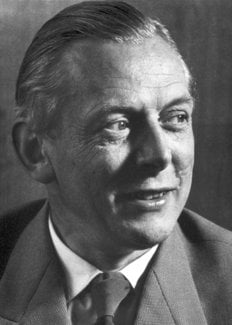Adolf Butenandt
Biographical

Adolf Frederick Johann Butenandt was born on March 24, 1903 at Bremerhaven-Wesermünde. The son of a business man Otto Butenandt of Hamburg, he went to school at Bremerhaven and studied chemistry at the Universities of Marburg and Göttingen. In 1927 he graduated at the University of Göttingen, where he had studied under Adolf Windaus.
From 1927 until 1930 he was Scientific Assistant at the Institute of Chemistry, Göttingen, and from 1931 until 1933 he was Privatdozent in the Department of Biological Chemistry at the University of Göttingen and acting Head of the laboratories for organic and inorganic chemistry. He then became Professor Ordinarius and Director of the Institute for Organic Chemistry at the Institute of Technology at Danzig, a post which he held until 1936.
From 1936 until 1960 he was Professor in the University of Berlin and Director of the Max Planck Institute for Biochemistry, Berlin-Dahlem, which later moved to Tübingen and then to Munich. From 1945 until 1956 he was Professor of Physiological Chemistry at Tübingen and in 1956 he became Professor of Physiological Chemistry in the University of Munich. From 1956 until 1960 he was Director of the Institute of Physiological Chemistry in the University of Munich.
Since 1960 he has been President of the Max Planck Society at Munich.
Butenandt’s name will always be associated with his work on sex hormones, for which he was awarded, jointly with Leopold Ruzicka, the Nobel Prize for Chemistry for 1939. In 1929 he isolated oestrone in pure, crystalline form, almost at the same time that E.A. Doisy did this in America. In 1931 he isolated androsterone in pure, crystalline form. From androsterone he as well as Ruzicka, independently of each other, obtained testosterone in 1939, a compound which had been obtained from the testes in 1935 by Ernst Laqueur. Progesterone was isolated by Butenandt from the corpus luteum in 1934.
In addition to these researches, Butenandt carried out much investigation of the interrelationships of the sex hormones and on the possible carcinogenic properties of some of them. His work on the sex hormones was largely responsible for the production of cortisone on a large scale.
A great number of honours and distinctions was bestowed upon him. He was awarded several medals and prizes from Germany, France, Sweden and England, he received the Grand Cross for Federal Services with Star (1959), he holds six honorary doctorates (Munich, Graz, Leeds, Madrid and two from Tübingen) and is Freeman of the city of Bremerhaven. He is corresponding member of the Academy of Sciences at Göttingen, honorary life member of the New York Academy of Sciences, and honorary member of the Japanese Biochemical Society, the Deutsche Akademie der Naturforscher Leopoldina, Halle, and the Austrian Academy of Sciences.
He married Erika Ziegner in 1931; they have seven children and live at Munich-Obermenzing.
This autobiography/biography was written at the time of the award and first published in the book series Les Prix Nobel. It was later edited and republished in Nobel Lectures. To cite this document, always state the source as shown above.
Adolf Butenandt died on January 18, 1995.
Nobel Prizes and laureates
Six prizes were awarded for achievements that have conferred the greatest benefit to humankind. The 14 laureates' work and discoveries range from quantum tunnelling to promoting democratic rights.
See them all presented here.
